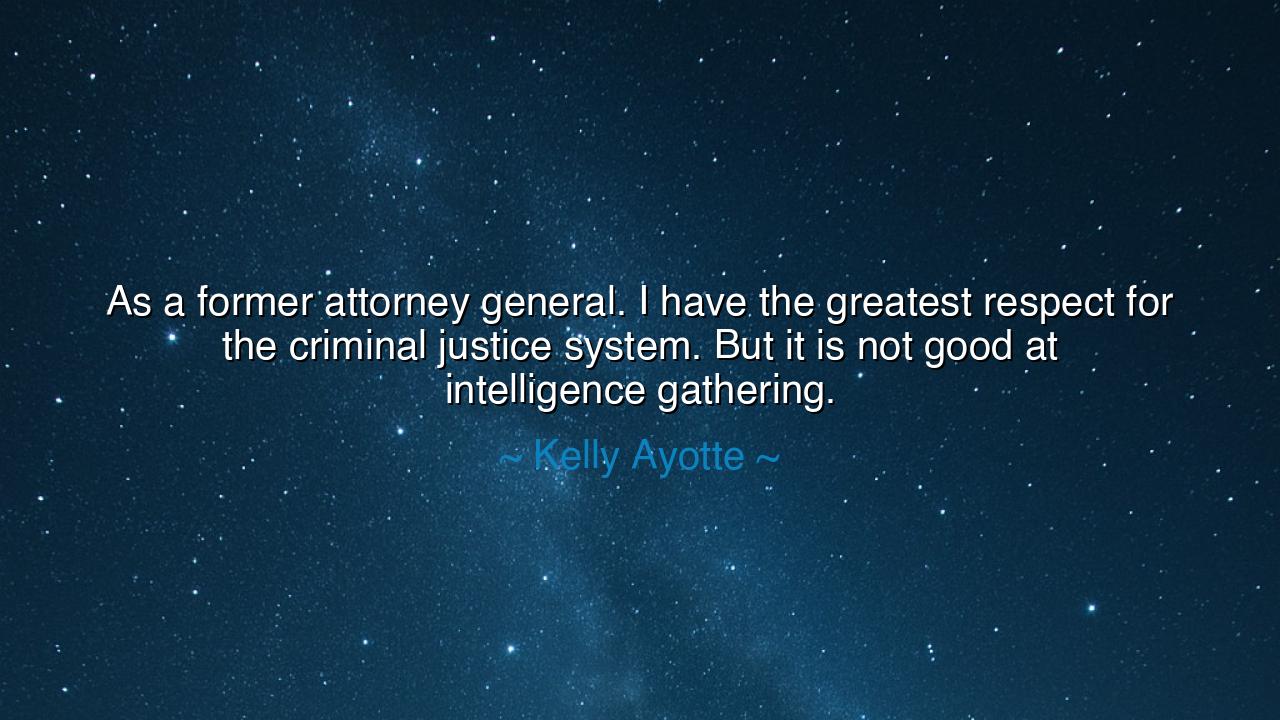
As a former attorney general. I have the greatest respect for the
As a former attorney general. I have the greatest respect for the criminal justice system. But it is not good at intelligence gathering.






The words of Kelly Ayotte, “As a former attorney general, I have the greatest respect for the criminal justice system. But it is not good at intelligence gathering,” carry the quiet weight of someone who has stood within the machinery of justice and seen both its grandeur and its limits. Beneath these measured words lies a truth that echoes across centuries: that justice and intelligence—though both serve the preservation of order—move by different laws of their own. The former is the pursuit of truth within light; the latter, the pursuit of truth within shadow. Ayotte, herself a servant of law, speaks not to diminish justice, but to remind us that its purpose is not the same as that of security.
To respect the criminal justice system is to honor one of civilization’s greatest creations—the idea that reason and fairness may triumph over vengeance and chaos. It is a structure built to protect the innocent, to restrain the passions of men, and to hold power accountable through transparency and process. Yet, as Ayotte rightly observes, this same system—so noble in its purpose—cannot easily serve the hidden world of intelligence gathering, where secrecy, speed, and ambiguity rule. The courtroom demands evidence; the intelligence officer must act before evidence is complete. The law seeks proof beyond doubt; the spy must move in the realm of uncertainty. Both are guardians, but one guards the law, the other guards the realm itself.
The origin of this tension is ancient. Long before modern courts or agencies existed, kings and councils understood that the sword of justice and the veil of intelligence could not be wielded by the same hand. In the courts of ancient Rome, the praetor and the spy served different masters: one served the ideal of equity, the other, the survival of the state. The praetor judged with the eyes of law; the spy saw with the eyes of necessity. When the two were confused, corruption followed; when kept distinct, balance endured. This wisdom—carved into the lessons of empire—still whispers through Ayotte’s words: that even the most just system falters when asked to do what only vigilance and cunning can achieve.
Consider the story of Queen Elizabeth I and her advisor Sir Francis Walsingham, one of history’s earliest masters of espionage. The queen’s courts of law, bound by the statutes of English justice, could punish crimes already committed—but it was Walsingham’s unseen network of agents that uncovered plots before they struck. His spies foiled conspiracies that might have destroyed the kingdom. In the eyes of justice, many of his methods were questionable; in the eyes of history, they preserved peace. Walsingham understood what Ayotte would one day declare: that intelligence gathering is not the craft of conviction, but the art of prevention. It thrives not on the rules of proof, but on the wisdom of foresight.
Ayotte’s reflection also bears a moral undercurrent, for it asks us to contemplate the delicate balance between law and security, between the visible and the unseen. The danger of relying solely on the justice system for national safety is that it moves too slowly to meet the swiftness of modern threats. Yet the danger of intelligence unchecked by justice is that secrecy, unrestrained, may erode the very freedoms it seeks to protect. Thus, her words serve as a call for balance: let justice remain the light by which we govern ourselves, but let intelligence be the shadow that keeps that light from being extinguished.
There is also a lesson here for each individual soul. For just as nations must balance law and intelligence, so must we balance reason and intuition within ourselves. The mind that relies only on evidence may miss what the heart perceives; the one that trusts only instinct may err in blindness. To live wisely, one must learn the art of discernment—to know when to follow the clear path of principle, and when to listen to the quiet warning that comes before proof. This is the intelligence of life itself: to sense the unseen and act before the storm breaks.
Therefore, let these words of Kelly Ayotte be remembered not only as a reflection on governance, but as a parable of human wisdom. Respect the systems of justice that keep the world fair, but understand that not all truth waits for proof. In matters of the heart, of destiny, of danger—listen for the whispers beneath the noise. Be lawful in spirit, but also watchful in soul. For as Ayotte reminds us, the world needs both the judge and the sentinel: the one who preserves what is right, and the one who guards against what may come.
And so, dear listener, carry this teaching into your life: honor justice, but cultivate intelligence. Let your actions be guided by truth, but tempered with foresight. The wise man, like the wise nation, knows that light alone cannot protect him—he must also learn to see in the dark.






AAdministratorAdministrator
Welcome, honored guests. Please leave a comment, we will respond soon